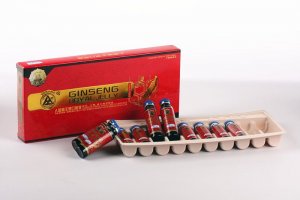
All iLive content is medically reviewed or fact checked to ensure as much factual accuracy as possible.
We have strict sourcing guidelines and only link to reputable media sites, academic research institutions and, whenever possible, medically peer reviewed studies. Note that the numbers in parentheses ([1], [2], etc.) are clickable links to these studies.
If you feel that any of our content is inaccurate, out-of-date, or otherwise questionable, please select it and press Ctrl + Enter.
Ginseng, royal jelly
Medical expert of the article
Last reviewed: 03.07.2025

Ginseng, royal jelly is perhaps the most common tonic, immunomodulatory and body-strengthening drug developed by Chinese specialists. This drug is usually used for prevention, but its medicinal properties are also significant - this is explained by a unique set of vitamins, proteins, carbohydrates, microelements and other useful substances.
 [ 1 ]
[ 1 ]
ATC classification
Active ingredients
Pharmacological group
Pharmachologic effect
Indications ginseng, royal jelly
When should the drug be used?
- For increased fatigue syndrome, chronic overwork.
- In case of decreased sexual function.
- To improve mental activity and memory.
- To strengthen the immune system and combat stress.
- To improve metabolic processes.
- With increased exposure to radiation.
- For cardiac pathologies.
- As a preventative measure against cancer, as a tonic during chemotherapy.
- For a quicker recovery after protracted illnesses or surgeries.
- In case of anemia, sleep and wakefulness disorders, general irritability.
- For inflammatory processes of the stomach, for atherosclerosis of the coronary vessels.
- For diabetes.
- For the prevention of vitamin deficiency and hypomineralization.
Release form
The drug is a brown opaque liquid with a distinctive aroma and sweetish taste. The liquid is sold in hermetically sealed 10 ml bottles, one package contains 10 identical bottles.
Ginseng, royal jelly consists of 1.8% extract from ginseng rhizomes, 0.09% extract from lemongrass, 2.7% royal jelly.
Pharmacodynamics
The drug has a natural composition, which functions as an excellent biological stimulant, activates immune defense, improves appetite and metabolic processes.
The pharmacological action of the drug is due to the content of:
- triterpene glycosides (AG);
- saponins-ginsenoids;
- various essential oils, sterols, peptides;
- vitamin complex (ascorbic, pantothenic, folic acids, biotin, inositol, thiamine, riboflavin, pyridoxine, cyanocobalamin);
- mineral components (potassium, sodium, calcium, magnesium, iron, phosphorus);
- microelements (zinc, manganese, copper, cobalt, sulfur, selenium, nickel, chromium, etc.);
- amino acids (histidine, tryptophan, valine, methionine);
- other biologically active substances (cholinesterase, acetylcholine).
Ginseng, royal jelly stimulates processes in the central nervous system, activates reflexes, enhances metabolic processes, regulates the endocrine system, stabilizes blood pressure, as well as cholesterol and sugar levels in the bloodstream.
The drug increases protein production, tones the body, suppresses inflammatory processes, dilates blood vessels, destroys bacteria and viruses, which can allow it to be taken for various pathologies.
Pharmacokinetics
Dosing and administration
The dosage and duration of treatment or prophylactic course should be determined by the doctor on an individual basis.
Usually adults and children over 12 years old take (swallow) 5-10 ml of the drug in the morning, on an empty stomach, 15-20 minutes before the first meal. Shake the bottle well immediately before use. The duration of treatment can last up to 1 month. If necessary, the course can be repeated 14 days after the end of the previous course.
Use ginseng, royal jelly during pregnancy
The use of Ginseng, Royal Jelly during pregnancy and breastfeeding is not recommended, as practical studies in this area have not yet been conducted. The decision to use the drug during these periods should be made by a doctor.
Contraindications
Contraindications to the use of the drug:
- allergic reactions to ginseng, lemongrass and various bee products;
- persistent hypertension;
- acute period of infectious pathologies;
- chronic liver disease;
- pregnancy and breastfeeding period;
- children under 12 years of age.
 [ 5 ]
[ 5 ]
Side effects ginseng, royal jelly
Side effects when taking Ginseng, royal jelly are relatively rare and are most often associated with an allergic response of the body to any component of the drug.
Less common side effects include:
- digestive disorders;
- increased heart rate;
- headaches;
- irritability and hypertension.
 [ 6 ]
[ 6 ]
Overdose
If large doses of Ginseng, Royal Jelly are accidentally swallowed, the following symptoms may occur:
- increased blood pressure, migraine-like pain, tachycardia, chest pain, depressive states, decreased libido;
- signs of intoxication, dyspeptic symptoms.
Treatment of overdose is symptomatic; in severe cases, gastric lavage and intestinal cleansing can be used.
Interactions with other drugs
The drug may enhance the effects of psychotropic substances, analeptics, psychostimulants, antidepressants (bemegride, camphor, phenamine, imizin, caffeine).
It is an antagonist of hypnotics, sedatives and anticonvulsants.
May enhance the effects of warfarin, increasing the risk of developing resistance to loop diuretics.
Storage conditions
The medicinal product Ginseng, royal jelly is stored in a place inaccessible to children, with a temperature regime from 15 to 24 ° C. It is necessary to protect the drug from exposure to ultraviolet rays.
 [ 12 ]
[ 12 ]
Shelf life
Shelf life is up to 2 years, if the bottle cap is intact.
Manufacturer
Attention!
To simplify the perception of information, this instruction for use of the drug "Ginseng, royal jelly" translated and presented in a special form on the basis of the official instructions for medical use of the drug. Before use read the annotation that came directly to medicines.
Description provided for informational purposes and is not a guide to self-healing. The need for this drug, the purpose of the treatment regimen, methods and dose of the drug is determined solely by the attending physician. Self-medication is dangerous for your health.

